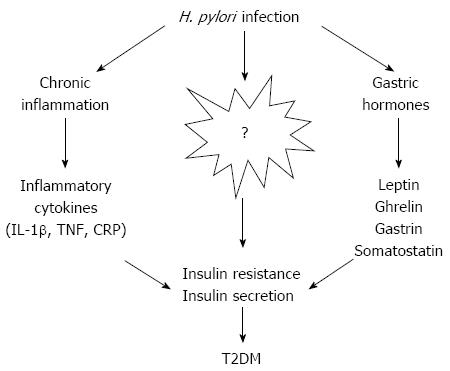Copyright
©2014 Baishideng Publishing Group Co.
World J Gastroenterol. Apr 28, 2014; 20(16): 4607-4617
Published online Apr 28, 2014. doi: 10.3748/wjg.v20.i16.4607
Published online Apr 28, 2014. doi: 10.3748/wjg.v20.i16.4607
Figure 1 Potential mechanisms for contribution of Helicobacter pylori to type 2 diabetes mellitus.
Insulin resistance and abnormal insulin secretion are central to the development of type 2 diabetes mellitus (T2DM). On the one hand, Helicobacter pylori (H. pylori) infection brings about chronic low-grade inflammation with upregulation of several cytokines such as C-reactive protein (CRP), tumor necrosis factor (TNF) and interleukin (IL)-1β, which may influence insulin action and pancreatic β cell secretion. On the other hand, H. pylori-induced gastritis can potentially affect the secretion of gastric hormones, including leptin, ghrelin, gastrin, and somatostatin, which could affect insulin sensitivity and glucose homeostasis. In addition, other mechanisms and mediators may be involved in the possible causative relationship between H. pylori infection and T2DM.
-
Citation: He C, Yang Z, Lu NH.
Helicobacter pylori infection and diabetes: Is it a myth or fact? World J Gastroenterol 2014; 20(16): 4607-4617 - URL: https://www.wjgnet.com/1007-9327/full/v20/i16/4607.htm
- DOI: https://dx.doi.org/10.3748/wjg.v20.i16.4607









